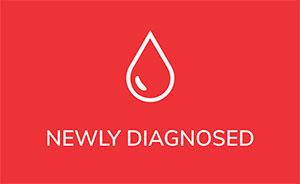Medically reviewed by Dr. Brian Koffman
Patients with chronic lymphocytic leukemia (CLL) and small lymphocytic lymphoma (SLL) are immunocompromised, meaning that their immune systems don’t function as well as those of healthy people. This leads to a reduced ability to fight infections and other diseases. In this interview, Dr. Brian Koffman spoke with Dr. Piers Patten, a clinical senior lecturer at King College London. They discussed immunity in patients with CLL / SLL.
What’s going on in the immune system of CLL patients?
Patients with CLL / SLL have an impaired immune system, so they have a more challenging time fighting infections. CLL and SLL are cancers of B cells, the immune cells in your body that produce antibodies. CLL cells can also affect other immune cells in the body, such as T cells. T cells are another type of immune cell that can directly kill infected cells or help coordinate the immune response to a pathogen. The T cells of patients with CLL tend to have an “exhausted” profile, meaning they are not working normally. All the different immune cells in your body work together, and if one part is not working right, it can throw off the balance of the entire immune response.
How do I know if I have an impaired immune system?
All patients with CLL / SLL have some degree of immune system impairment, but it becomes more concerning when it leads to problems like infections. One sign of an impaired immune system is recurrent infections. Recurrent respiratory infections, recurrent urinary tract infections, or shingles outbreaks may be signs of impaired immunity. Patients with low levels of disease tend to have fewer immune problems than patients getting closer to needing treatment.
Some treatments for CLL can also make infections worse. While these drugs are targeted to CLL cells, they can affect other immune cells. Overall, the patients most likely to get infections are those who are close to needing treatment, patients with progressive disease, or patients currently on treatment.
What did we learn from the COVID-19 pandemic?
Things have improved since the beginning of the COVID-19 pandemic. Initially, the population had very little immunity to COVID-19, and older adults were particularly vulnerable to it. CLL was an added risk factor on top of other general risk factors, and common-sense precautions such as masking and handwashing were very important.
Today, patients with CLL are less affected by COVID-19 and are less likely to have serious consequences from an infection. There is less exposure to COVID-19 because more people have immunity. Vaccinations are widely available, and antiviral therapies and antibody treatments are now available. We also learned that vaccines can be used to reduce the severity of an infection rather than necessarily prevent an infection.
How do vaccines work in CLL patients?
Patients with CLL don’t respond as well to vaccines as healthy people. Thus, they need more doses of vaccine to get a vaccine response. While some patients never get a vaccine response, the majority of patients with CLL will benefit from vaccinations.
Any advice for CLL patients?
Be aware of common infections and keep your vaccinations up to date. In addition to the COVID-19 vaccine, some vaccines to consider are pneumococcal, shingles, RSV, and influenza. While it can be difficult, try to balance using common-sense precautions to prevent infections and maintaining your quality of life.
Links and Resources:
Watch the interview with Dr. Piers Patten:
Watch the on-demand recording of CLL Society’s webinar on the impact CLL has on the immune system of patients, Immunity and CLL: It’s Complicated but Understandable.
Take care of yourself first.
Ann Liu, PhD



